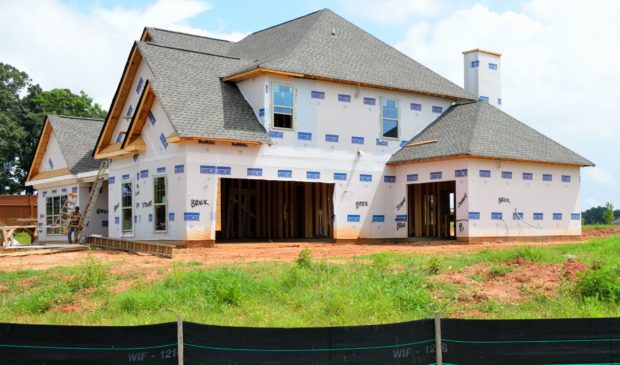Lack of contractor oversight leaves Texas homeowners unprotected
Thursday, July 21, 2016 by
Syeda Hasan Amir Khalil and his girlfriend, Emily Thomas, bought their duplex off of South Lamar in February, but so far, it doesn’t feel quite like home.
Khalil pointed out the damage that’s left over from an incomplete remodel job on the house. The laundry room ceiling has a gaping hole. In the kitchen, sections of the walls and ceiling have been torn out.
As first-time homebuyers, Khalil and Thomas had their hearts set on this neighborhood, but that meant settling for a house that required some fixing up. Khalil interviewed several general contractors before landing on one he felt he could trust. He said they started out with small jobs, like retiling the laundry room. At first, things were going smoothly. But then, checks started bouncing. Khalil said some of the subcontractors weren’t getting paid and began hounding him for money. He said he reached out to the contractor, trying to work out a payment plan.
“Finally he just admits it,” Khalil said. “‘I spent the money, I mismanaged the job, I never even bought the materials. The money’s gone.’”
Fixing this mess soon became a full-time job. Khalil spent his evenings filing police reports, writing to city officials, even the Texas attorney general. He was shocked to learn that even if the contractor failed to pay other workers and suppliers, Khalil himself was legally responsible.
“I have to repay subcontractors,” Khalil said. “I have liens on the house, and as a first-time homebuyer, I’m just like, what have I done? There’s no resources to help me out. I’m kind of on my own.”
Then one night, Khalil thought he found a state agency that could help – the Texas Residential Construction Commission, or TRCC. It provided oversight of homebuilders, remodelers and construction companies and helped resolve disputes with homeowners. The only problem – it was abolished in 2009.
William Lutz is the former managing editor of the Lone Star Report. He was covering the Texas Capitol when the TRCC was still in operation.
“What the TRCC was about was seeing if you could have an administrative agency that would make it easier to address these concerns so that they didn’t have to go to court, which can be a very long, drawn-out and expensive process,” Lutz told the Austin Monitor.
Lutz said from its inception, several lawmakers had concerns about the agency’s legitimacy.
“It changed the yardstick that was used to determine what was a construction defect that you could take action on,” he said. “It gave this commission, which was very favorable to the builders, a whole lot of discretion over how that worked.”
The commission inspected hundreds of claims of home defects, but a majority of those cases ended up going to court anyway. In a state survey, about 69 percent of homeowners said the TRCC did not help them resolve disputes with builders. Some questioned whether the agency was really providing oversight or whether it was just helping builders avoid lawsuits.
“You know, a lot of times, there’s this attitude at the Capitol that business is always opposed to regulation, and that regulation is always sticking up for the little guy (as) opposed to some large entity,” Lutz said. “And a lot of times in real life, it’s not that simple. Sometimes businesses wind up embracing regulation because it solves problems for them.”
When Sunset Advisory Commission staff reviewed whether the agency should continue, they concluded that it was never meant to provide meaningful oversight. Now, without any state regulation, some local municipalities have taken the matter into their own hands. San Marcos, for example, requires all contractors to register with the city. They also need to pass a construction course.
Steve Van Patten is the chief building official with the city of San Marcos. He said city leaders were hearing complaints from residents about builders doing subpar work.
“And there was nothing in place to actually stop these folks,” Van Patten told the Monitor. “And I guess that’s kind of something we see across many jurisdictions across the state of Texas. So what they did is they decided they would put some requirements in place to qualify those individuals.”
Today, San Marcos has 208 contractors registered with the city. Austin, by contrast, does require licenses for some specialized contractors, but not for general contractors, like the kind Khalil hired.
“Maybe they tried something, it wasn’t successful, but at this point it seems like anything is better than nothing, specifically with the amount of growth we’re experiencing in Austin,” Khalil said. “It’s like a perfect target for anyone who wants to commit these kinds of actions.”
Khalil said this has to have happened to other homeowners in Austin and around Texas. But for now, creating new regulations isn’t a priority for state lawmakers. The legislative session that starts in January is expected to focus on shrinking revenues, problems with Child Protective Services and education funding. No one is campaigning on homebuilder regulations.
This story was produced as part of the Austin Monitor’s reporting partnership with KUT.
A complete list of Austin Monitor donors can be found here.
You're a community leader
And we’re honored you look to us for serious, in-depth news. You know a strong community needs local and dedicated watchdog reporting. We’re here for you and that won’t change. Now will you take the powerful next step and support our nonprofit news organization?









